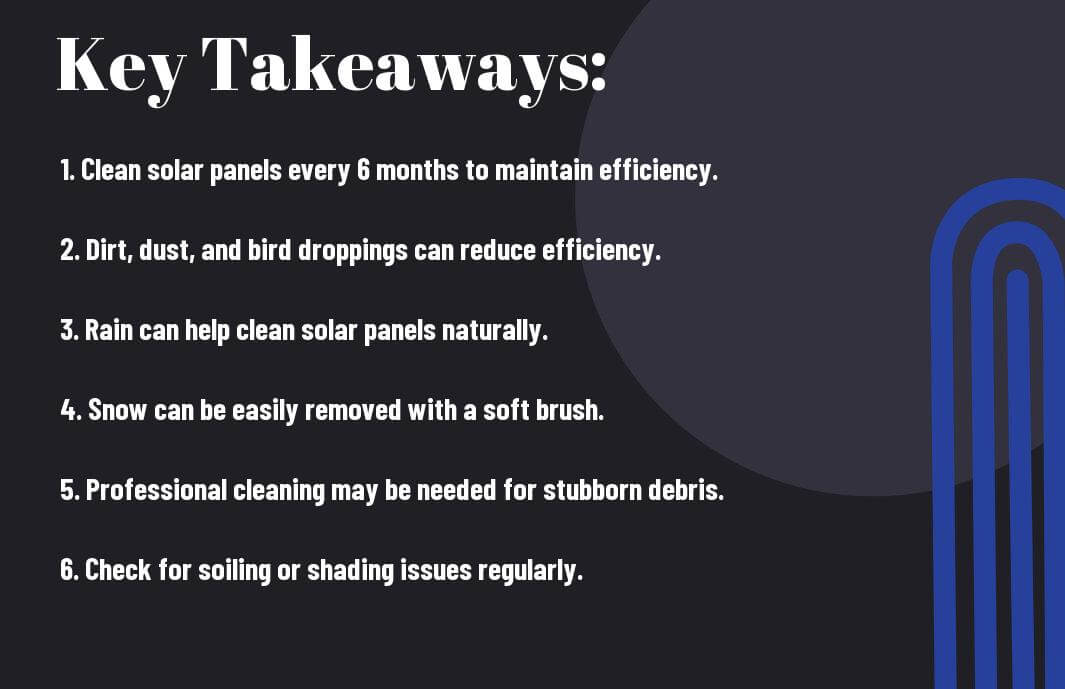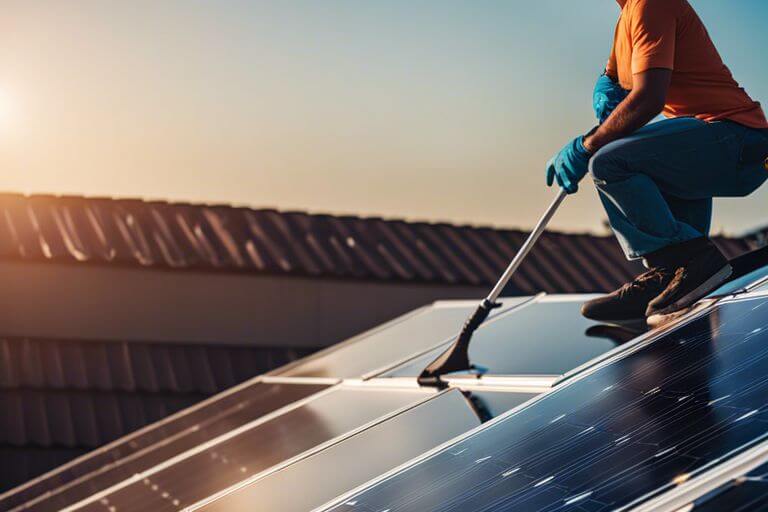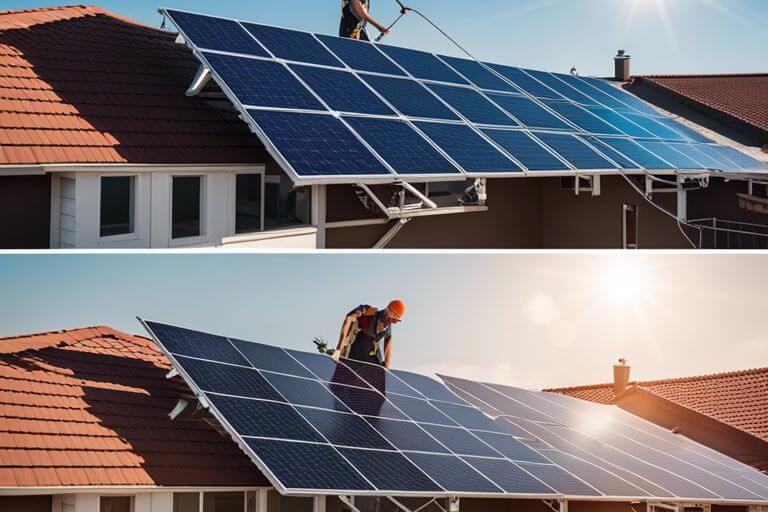Most solar panels are self-cleaning thanks to rain and wind, but environmental factors like dust, dirt, bird droppings, and pollen can affect their efficiency over time. You should inspect your solar panels at least twice a year and clean them as needed to ensure optimal performance. Regular maintenance will help you get the most out of your solar investment and reduce your electricity bills in the long run.
Key Takeaways:
- Frequency: Solar panels typically need to be cleaned 1-2 times per year.
- Factors to consider: The location, tilt angle, weather conditions, and presence of dirt or debris can affect how often solar panels need to be cleaned.
- Efficiency: Regular cleaning of solar panels can help maintain their efficiency and ensure maximum energy production.

The Importance of Cleaning Solar Panels
A Maintenance schedule: How often to clean solar panels is crucial for the efficiency and longevity of your solar panels. Regular cleaning ensures that your panels operate at their maximum capacity, optimizing energy production.
Efficiency and Energy Output
Panels that are clean and free of dirt, dust, and debris perform significantly better than those covered in grime. The accumulation of dirt can obstruct sunlight, reducing the amount of energy your panels can generate. Therefore, cleaning your solar panels regularly is vital to maintain their efficiency and maximize your energy output.
Effects of Dirt and Debris on Solar Panels
Any dirt or debris on your solar panels can have detrimental effects on their performance. Dust, bird droppings, leaves, and other pollutants can create shading and hot spots on the panels, leading to a decrease in their efficiency. Regular cleaning not only ensures optimal energy production but also helps extend the lifespan of your solar panels.
The effects of dirt and debris on solar panels are not just cosmetic; they can have a significant impact on the overall performance of your solar energy system. By keeping your panels clean, you are investing in their longevity and efficiency, ultimately saving you money in the long run.
Factors Affecting Cleaning Frequency
Little factors can influence how often you need to clean your solar panels. Understanding these key variables is crucial for maintaining the efficiency of your solar energy system. Here are some factors that can affect the frequency of cleaning:
- Environmental conditions
- Panel angle and orientation
- Climate and weather patterns
Environmental Conditions
On sunny days, dust and dirt accumulate faster on your solar panels, potentially reducing their efficiency. If you live in a dusty area or near construction sites, you might need to clean your panels more frequently. Additionally, pollution levels and bird droppings can also impact the cleanliness of your solar panels. Remember that the cleaner your panels are, the better they can convert sunlight into electricity.
Though regular rain showers can help wash off some dirt from your panels, it may not be sufficient to keep them clean, especially if you live in a region with infrequent rainfall or high levels of air pollution.
Panel Angle and Orientation
Factors such as the tilt angle and orientation of your solar panels play a crucial role in determining how often you should clean them. Panels installed at a steep angle may shed dust and debris more easily when it rains, requiring less frequent cleaning. Conversely, flat panels or those with a shallow tilt may accumulate dirt faster and need more regular cleaning to maintain peak performance.
Conditions such as the direction your panels face can also affect cleaning frequency. Panels that face south are more exposed to sunlight and may accumulate more dust than those facing other directions. Consider these factors when determining the cleaning schedule for your solar panels.
Climate and Weather Patterns
Climate plays a significant role in how quickly your solar panels get dirty. In areas with high humidity or frequent fog, dirt and grime can stick to the panels more stubbornly, requiring more frequent cleaning. Harsh weather patterns like strong winds carrying dust and debris can also impact the cleanliness of your solar panels.
Orientation towards prevailing wind directions can also influence how dirty your panels get. If your panels are situated in a path where winds often carry dust and pollutants, you may need to clean them more frequently to ensure optimal energy production.

Signs Your Solar Panels Need Cleaning
Visible Dirt and Debris
Dirt and debris accumulating on your solar panels can hinder their efficiency. If you notice a layer of dust, dirt, bird droppings, or leaves covering your panels, it’s time for a clean. These obstructions can block sunlight and reduce the amount of energy your panels can absorb.
Decreased Energy Output
Debris such as bird droppings, leaves, or pollen can reduce the energy output of your solar panels. If you observe a sudden drop in your energy production without any other explanation, it’s likely that built-up debris is preventing your panels from performing optimally.
The decreased output may not be immediately noticeable, but over time, you could be losing out on significant energy production and cost savings if your panels are not cleaned regularly.
Increased Temperature
| The Effects | Solution |
| When debris accumulates on your solar panels, it can cause them to heat up. | Regular cleaning can help prevent excessive heat buildup and maintain the efficiency of your panels. |
Cleaning: Solar panels that are covered in dirt and debris may heat up more than clean panels. This increase in temperature can reduce the efficiency of the panels and lead to a decrease in energy production. Regular cleaning can help prevent excessive heat buildup and ensure that your panels continue to operate at their best.
To ensure that your solar panels are performing at their peak, it’s vital to keep an eye out for these signs that indicate they need cleaning. By maintaining clean panels, you can maximize energy production and prolong the lifespan of your solar energy system.

How to Clean Solar Panels
Once again, it’s crucial to keep your solar panels clean to ensure optimal performance. Cleaning your solar panels can be a straightforward task if done correctly. Here are some steps to follow to clean your solar panels effectively.
Safety Precautions
One of the critical aspects of cleaning solar panels is ensuring your safety. Before you start cleaning, make sure to switch off the system to prevent any electrical mishaps. Additionally, work in the early morning or late afternoon to avoid hot surfaces that can cause burns. Use a sturdy ladder to reach the panels safely and consider using personal protective equipment like gloves and non-slip footwear.
Cleaning Methods and Tools
Safety should always be your top priority when cleaning solar panels. It is recommended to use a soft brush with an extended handle to remove dirt and debris without damaging the panels. Additionally, using a hose with a nozzle or a bucket of soapy water can help you rinse off any stubborn grime. Avoid using abrasive materials or harsh chemicals as they can scratch the panels and reduce their efficiency.
It’s crucial to clean your solar panels at least twice a year to maintain their performance. Regular cleaning will ensure that dirt, debris, and bird droppings do not block sunlight from reaching the cells. Set a schedule in spring and autumn to clean your panels thoroughly. Remember to check the manufacturer’s guidelines for specific cleaning instructions to avoid voiding any warranties.
By following these simple cleaning steps and safety precautions, you can maintain the efficiency of your solar panels and enjoy maximum energy production from your system.
Professional Cleaning vs. DIY
After considering the importance of keeping your solar panels clean for optimal efficiency, you may be wondering whether to take on the task yourself or hire a professional. Let’s explore the benefits of each option and when it’s best to choose one over the other.
Benefits of Professional Cleaning
Professional cleaning services have the expertise and equipment necessary to thoroughly clean your solar panels without causing any damage. They can efficiently remove dirt, debris, and other build-up that may be affecting your panels’ performance. Additionally, hiring a professional ensures that the job is done safely, especially if your solar panels are located in hard-to-reach areas.
By enlisting the help of professionals, you can save time and effort while ensuring that your solar panels are cleaned effectively. They can also identify any potential issues during the cleaning process, allowing you to address them before they become major problems.
When to DIY and When to Hire a Pro
Cleaning your solar panels yourself can be a cost-effective option if they are easily accessible and not extremely dirty. If you have the necessary tools, such as a gentle cleanser and a soft brush, you can safely clean your panels without professional help. However, if your panels are heavily soiled or located on a high roof, it’s best to leave the job to the experts.
Maintenance and Inspection
Regular Inspections
Many factors can affect the efficiency of your solar panels over time. Regular inspections are crucial to ensure your system is functioning optimally. You should perform visual checks on your panels at least once a year to look for any signs of damage, such as cracks or discoloration. Additionally, monitoring the connections and wiring for any wear and tear is important to prevent any potential problems in the future.
Preventative Maintenance
Any potential issues with your solar panel system can often be mitigated through preventative maintenance. This includes keeping the panels clean, trimming nearby trees that may cast shadows on the panels, and ensuring proper ventilation around the system. Regularly inspecting and cleaning your panels can help prevent debris buildup and maximize sunlight absorption, ultimately improving the overall efficiency of your system.
Maintenance schedules may vary depending on your location and environmental factors. It is imperative to consult with a professional to determine the ideal preventative maintenance routine for your specific solar panel setup.
Troubleshooting Common Issues
With proper maintenance, you can address common issues that may arise with your solar panels. One common problem is a drop in energy production, which could be caused by shading from nearby objects or dirt accumulation on the panels. By regularly monitoring your energy output and identifying any noticeable decreases, you can take proactive steps to rectify the issue and maintain peak performance.
On Inspection
Inspection of your solar panels is imperative to ensure they are operating efficiently and generating maximum energy output. By conducting regular inspections, you can catch any potential issues early on and address them promptly, ultimately prolonging the lifespan of your solar panel system. If you notice any significant changes in performance or physical damage during your inspections, it is advisable to seek professional assistance to address the problem effectively.
Summing up
So, how often do solar panels need to be cleaned? The answer depends on your location, the angle of your panels, and the amount of dust and debris they accumulate. In general, it is recommended to clean your solar panels at least once or twice a year to ensure optimal efficiency. However, if you live in a dusty area or experience frequent rainfall, you may need to clean them more often to maximize energy production.
FAQ
Q: How often do solar panels need to be cleaned?
A: Solar panels generally require cleaning every 6 months to 1 year, depending on the location and weather conditions. Areas with high levels of dust, dirt, or pollen may require more frequent cleaning.
Q: What are the signs that indicate solar panels need cleaning?
A: Signs that indicate solar panels need cleaning include a noticeable decrease in energy production, bird droppings or leaves covering the panels, and visible dirt or grime accumulation on the surface of the panels.
Q: How should solar panels be cleaned?
A: Solar panels can be cleaned with water, a gentle cleaning solution, and a soft brush or cloth. It is important to avoid using abrasive materials or high-pressure water, as this can damage the panels. It is recommended to hire a professional cleaning service for safe and effective cleaning.
